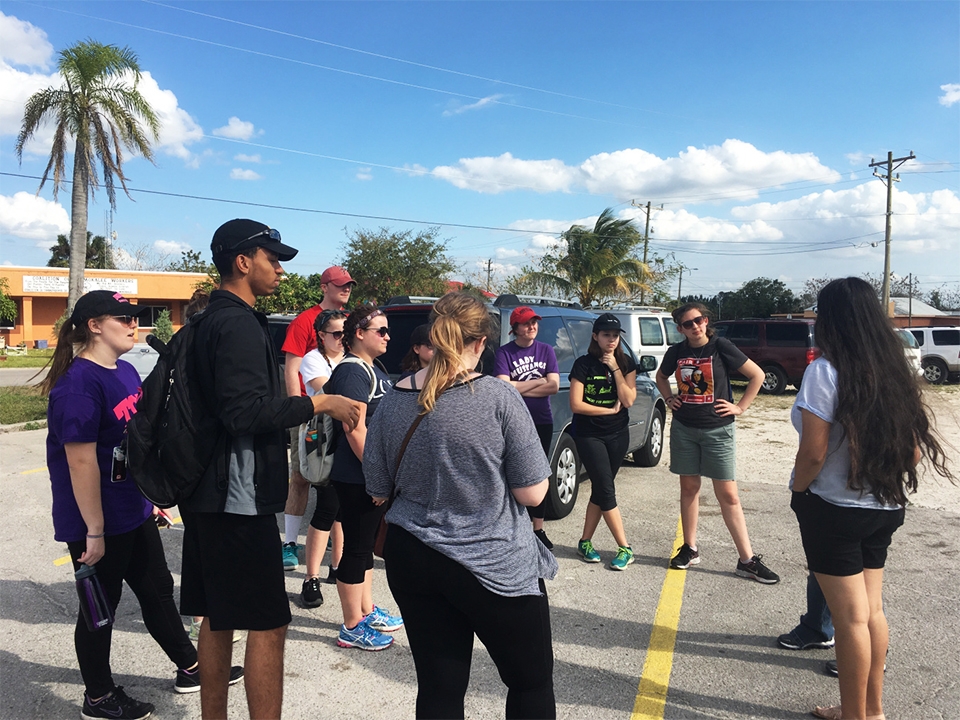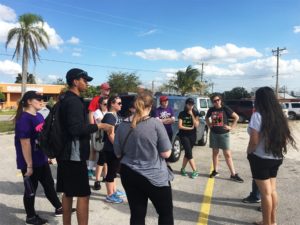
Students from Duquesne annually go to Florida over Spring Break to help migrant workers in the region. They assist the CIW advocacy organization in fighting for better working conditions.

Students from Duquesne annually go to Florida over Spring Break to help migrant workers in the region. They assist the CIW advocacy organization in fighting for better working conditions.
Sairah Aslam | Staff Writer
03/22/18
For years, Duquesne students have participated in a tradition of service and advocacy. Included in this tradition is the continued support for the Coalition of Immokalee Workers and their rights for the past 30 years.
In 1993, farmworkers created the Coalition of Immokalee Workers as a grassroots advocacy organization and began campaigning for fair wages and working conditions for farmworkers.
The group also designed the Fair Food Program, which outlines logistical regulations to ensure farmworkers’ higher wages, access to water and shade, greater job security and protection from, as well as redress for, physical and sexual abuse in the fields.
Duquesne became involved in the CIW’s movement thanks to Rev. Don McEachin, a Spiritan, who heard about the workers’ plights; he decided to take a small group of students and priests to Immokalee in order to express their support and offer a helping hand. In fact, McEachin and the rest of the group ultimately assisted the workers picking in the fields.
Since then, Duquesne’s Spiritan Campus Ministry has sponsored a Cross-Cultural Mission Trip to Immokalee every spring break, offering the students and staff a chance to be a part of the CIW’s movement.
This past spring break, those who participated in the trip helped prepare artwork and supplies for the CIW’s use as it rallied against Wendy’s in New York last week.
Joe Ratay, a graduate assistant at Duquesne that took part in this past trip to Immokalee, praised the work the CIW has accomplished.
“The CIW’s model is already being used around the world to make more ethical labor practice,” Ratay said. “The more that we learn about the model, the [better] we can use it in other countries and other industries.”
At first, the CIW struggled to gain leverage with which to advocate for their rights. After a series of hit-and-miss tactics, the Coalition rallied with college students in 2000 to push Taco Bell off their campuses until it signed onto the program.
Campus Minister Kate Lecci, who leads a group of Duquesne students to serve in Immokalee each spring break, explained the importance of farmworkers’ plights to the average American consumer.
“At some point, you have eaten food that these farmworkers have picked, and you would not have been able to eat that food had they not picked it,” Lecci said. “You are connected to them because you are reliant on their labor.”
College students agreed. After four years of student boycotts and public pressure, Taco Bell signed, followed by McDonald’s, Walmart and many other leading fast food giants and food retail companies. Now, the most significant holdout is Wendy’s, something the students hope to change.
Bella Guzzi, a sophomore who embarked on the trip, said that the CIW “breathes hope and justice in the work of the people.”
Alyssa Lukoch, who also worked with the CIW in Immokalee, agreed.
She said, “As residents of Pittsburgh, we also have a responsibility to stand by the farmworkers showing that our community supports fair trade and our city advocates for justice.”
The struggle for independence and rights has a long history in Immokalee. When settlers first flooded into southern Florida in the early 1800s, they asked the native Seminoles what they called the land on which they stood. They responded, “I-Muglé, I-Muglé.” The white men, taking that word to mean “my home” in their language, named the town founded soon after “Immokalee.” But, according to Silvia Giagnoni in Fields of Resistance, the Seminoles were actually crying out “My prison, my prison.”
According to the Harvest of Shame documentary by journalist Edward Murrow, thousands of migrant farmworkers in the tomato fields of Florida have lived in modern-day slavery since the 1900s. Employers used debt bondage to hobble farmworkers’ autonomy, and crew leaders often “forgot” to pay pickers. If they were paid, their earnings fell far below minimum wage.
Farmworkers were often forced to work up to 15 hours a day, and they were not hired consistently. They were not allowed water, shade or rest. They faced rampant physical and sexual abuse, and they had no redress for grievances.
For more information about Duquesne’s partnering with the CIW and how to get involved, contact Kate Lecci at leccik@duq.edu.
Gabriella DiPietro contributed reporting.



